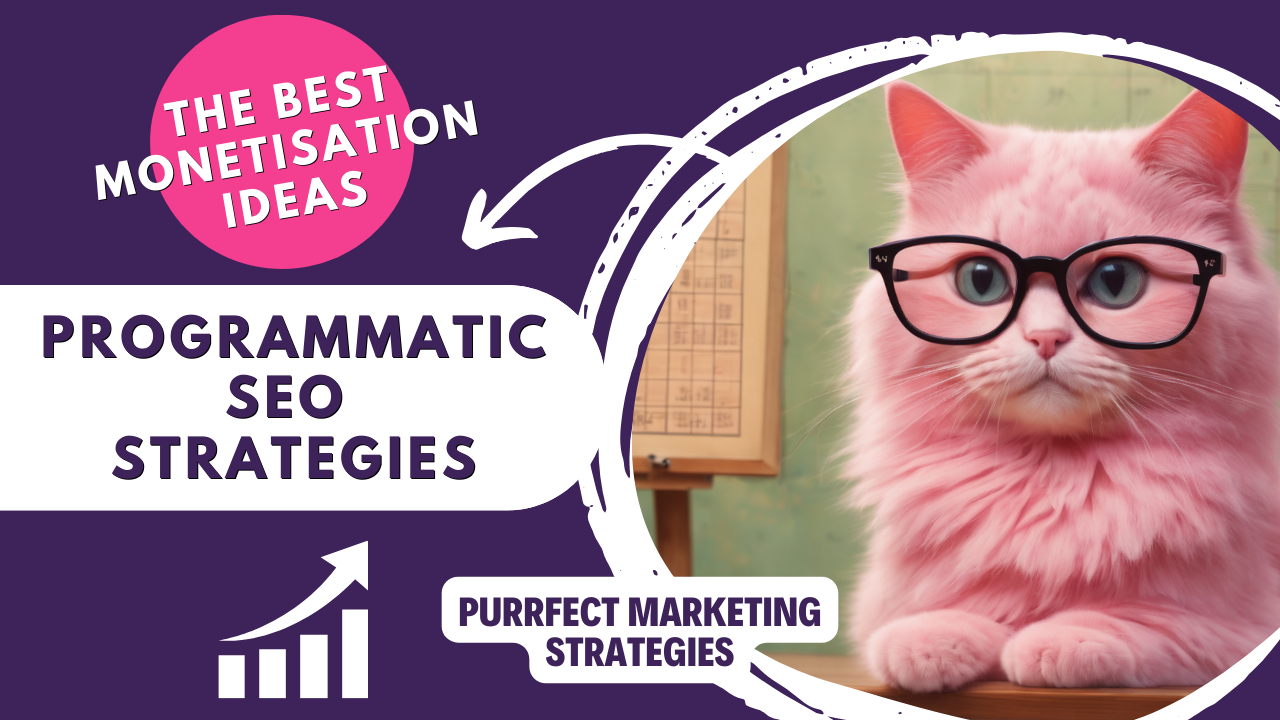Hello my human fellow marketers! Today I will show you the best strategies to use with programmatic SEO to monetise a website. You will learn the most profitable ideas on business models based on programmatic SEO.
You probably have heard that programmatic SEO is a good way to leverage big data, working smarter, not harder. However, you might not know yet how to apply to your website, whether a business or a content-based site. Today I will show you why you need programmatic SEO and why the fuss around it.
If you are not sure what programmatic SEO is, have a look at what is programmatic SEO and how to use it.
For a step-by-step tutorial on how to create multiple pages with programmatic SEO, check out that article. There I show you the best tools to use as well.
And if you want to get the insights from a real life scenario where programmatic SEO was applied, check out the case study of a home repair service that boosted their rankings using ChatGPT to create programmatic SEO generated pages.
Finally, don´t miss the round-up of the top websites using top programmatic SEO examples.
Now, let’s dive into today’s topic, which is what you can actually do with this powerful tool and to make money out of it.
The best business models to monetise programmatic SEO
Creating a website with 500 pages of programmatic SEO content that lists businesses in an area or town can generate financial benefits through several monetisation strategies. Here is an exhaustive list.
1. Rank and rent model
This is probably one of the most popular ways to implement programmatic SEO. There are two ways, essentially, that you can go about it.
Local Business Niches: Create pages targeting specific local services (e.g., plumbers, electricians, dentists) in different cities or neighbourhoods. Once these pages rank well in search engines, you can rent them out to local businesses. In this type of website you rent the position in the ranking to different businesses and they will be shown side-to-side.
Industry-Specific Services: Focus on industries like real estate, legal services, or medical practices. Build pages for different service providers and lease the top-ranking pages to relevant businesses. Unlike the local business niches model, in this case you only rent it to one business, who would adapt the site to their branding.
2. Directory website
Local or niche directories: Build a comprehensive directory of local businesses, services, or attractions in various regions. Monetise through premium listings, featured spots, and advertising.
Also, you can create directories for specific niches like wedding vendors, pet services, or tech startups. Offer paid listings, advertising space, and premium placement for businesses.
As a pro tip, you can leverage discounts in a double way. Partnering with salons to offer exclusive deals and coupons to your website visitors can attract more traffic and generate income. Charging a fee or taking a commission on each deal or coupon redeemed through your site can further increase your earnings.
3. Affiliate marketing sites
Product Review Pages: Generate pages for product reviews, comparisons, and best-of lists in various categories (e.g., electronics, home appliances, fashion). Embed affiliate links to earn commissions from sales.
Coupon and Deals Sites: Create pages for coupons, deals, and discounts across different retailers and brands. Use affiliate links to monetise the traffic. You can go one step further and offer cashback to users when they use your codes. In this case, the user would be paid back whenever after the affiliate receives the commission.
4. Lead generation sites
Service Provider Leads: Build pages for different service providers (e.g., contractors, financial advisors, fitness trainers) to capture leads. Sell these leads to the respective businesses.
You can go for the extra mile if you niche down on B2B Lead Generation. Focus on B2B services and generate pages that attract businesses looking for specific solutions (e.g., software, marketing services). Capture and sell these leads to B2B companies.
5. News and events aggregation sites
News Aggregator: Create pages that aggregate news and updates from different sources on specific topics (e.g., tech news, sports news). monetise through display ads and sponsored content. You can do the same for Events in an area or town. Build pages listing events in various categories (e.g., concerts, conferences, festivals). monetise through ticket affiliate links and event promotions.
6. Real estate listing sites
Property Listings: Generate pages for real estate listings, including residential, commercial, and rental properties. monetise through advertising, premium listings, and lead generation.
7. Job board sites
Industry-Specific Job Boards: Create job listing pages for specific industries or job categories (e.g., tech jobs, healthcare jobs). monetise through job posting fees and advertising. Local Job Boards: Build local job boards targeting specific cities or regions. Offer premium listings and advertising to local businesses.
8. Educational resource sites
Course Listings: Generate pages for online courses, workshops, and training programs. monetise through affiliate links to course providers and sponsored listings. You can gain organic traffic to the site by offering study guides and resources, for instance. Create pages with study guides, tutorials, and educational resources on various subjects. monetise through display ads, affiliate links, and premium content.
By implementing these monetisation strategies, you can effectively generate financial benefits from your programmatic SEO content while providing valuable resources to your users and local businesses.
If you have further business ideas on how to monetise content generated with programmatic SEO, do let me know. You can find me on X and Instagram.
Stay whisker-tuned for my next purr-fect marketing update!
Moxie

